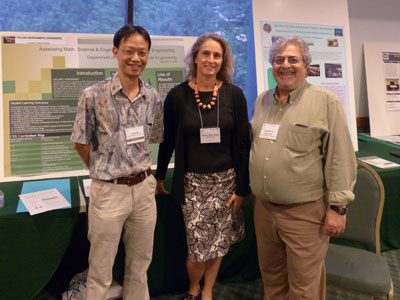
This poster will present how the Civil Engineering B.S. program utilized multiple sources of evidence to evaluate the student ability to apply mathematical skills in solving engineering programs and how the program has utilized results to make programmatic improvement. To assess students’ ability to apply math skills to solve engineering programs, our faculty used the results from Fundamental in Engineering license exam and course embedded assessment. In the licensure exam, we found student scores on the Structural analysis section, which involves using math to solve engineering problems, have been lower than average in the past few years. Using embedded course assessment, faculty in the course 361 Transport Engineering and 381 Structure analysis give students engineering tasks that require them to use math skills. These tasks are evaluated using a rubric. The results on the math skills show that the student performance did not meet the target (more than 80% students scoring 3 and 4’s and fewer than 5% students scoring 1) set by the department. As the students assessed were juniors and the target was set for the graduating class, the data indicate either more work needs to be done to bring students up to the desired level of performance, or a scaled scoring system needs to be used to compensate the mismatch between the expectation (target) and the status of the students assessed.
The program assessment coordinator and course instructors collect and summarized the assessment results. The program faculty collaboratively interpreted the results and discussed improvement strategies. The program used the assessment results and made multiple curricular improvements, such as changing the Structure analysis course from the electives to required courses, limiting enrollment, increasing frequency of course offerings, modifying expectations on the rubric, and applying appropriate standards to students at different academic levels.
We think that our program’s assessment practices can inform skill-based outcome assessment for other programs. We will also share lessons learned. By David Ma
Recommended Citation:
Ma, David. (2014, April). Assessing Math, Science & Engineering Skills in Civil Engineering. Poster session presented at the Assessment for Curricular Improvement Poster Exhibit at the University of Hawai‘i at Mānoa, Honolulu, HI.
